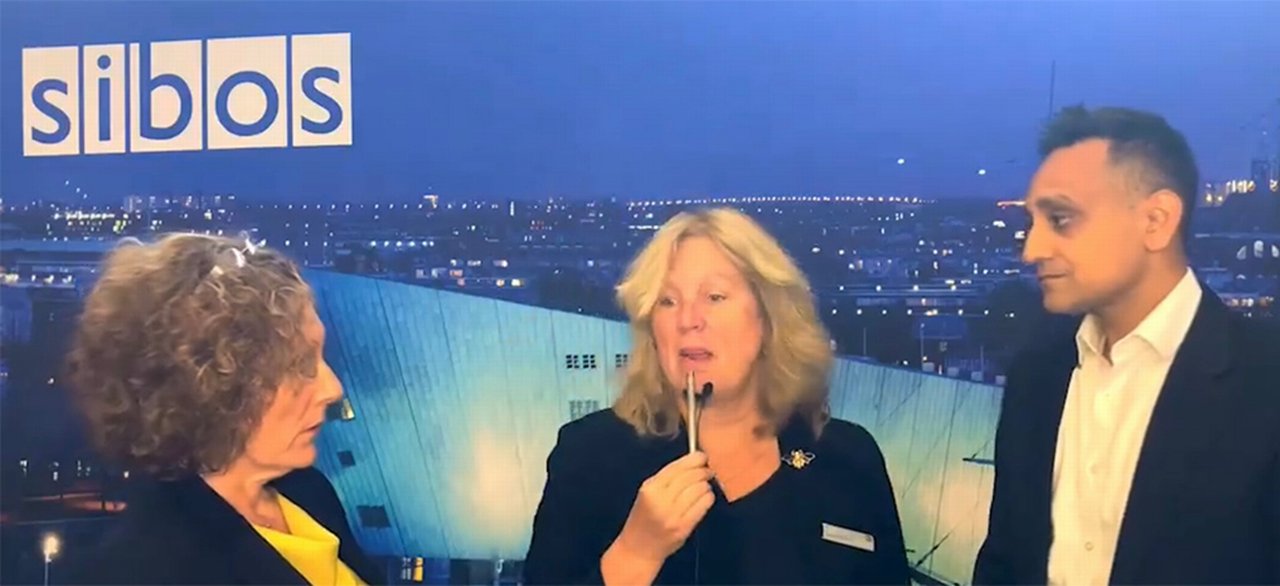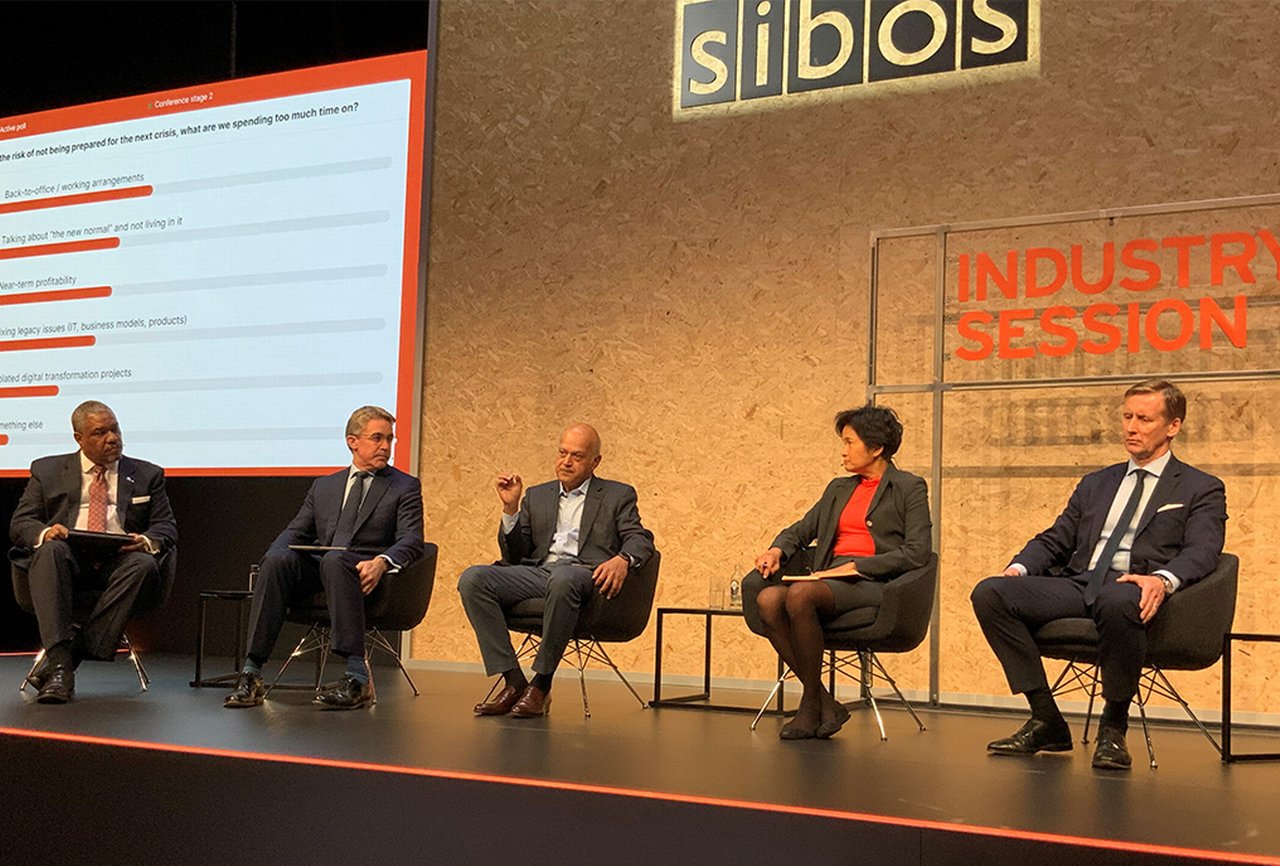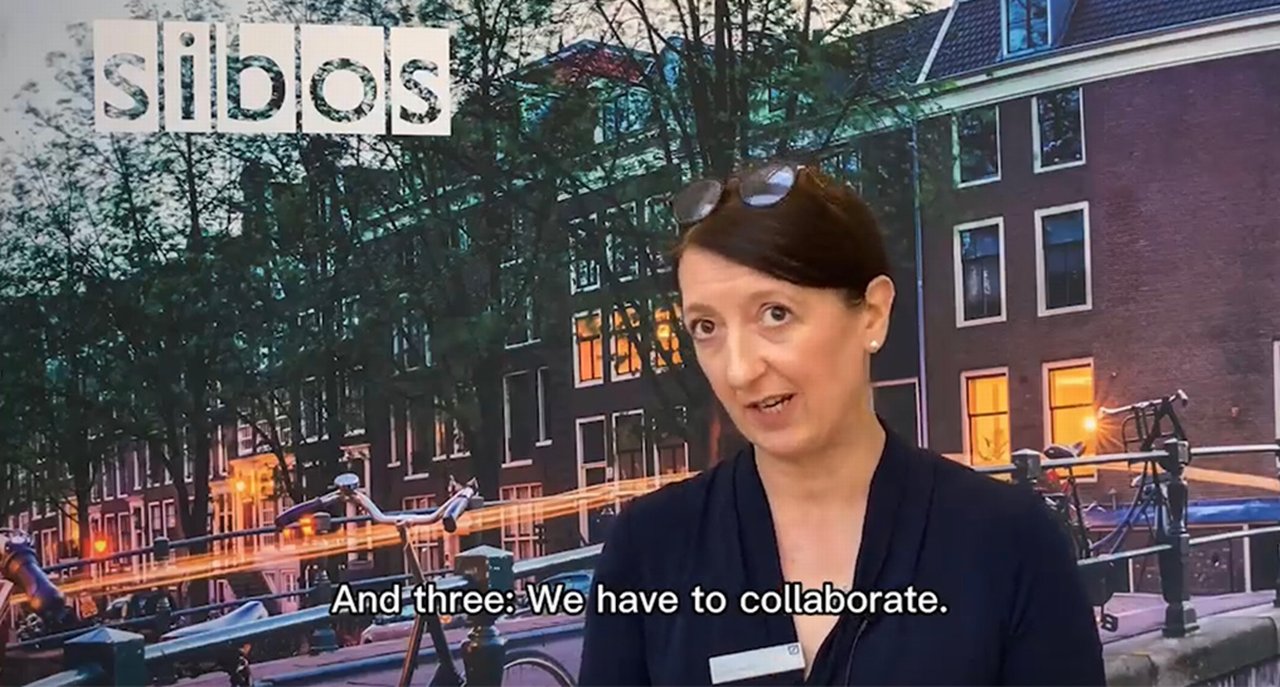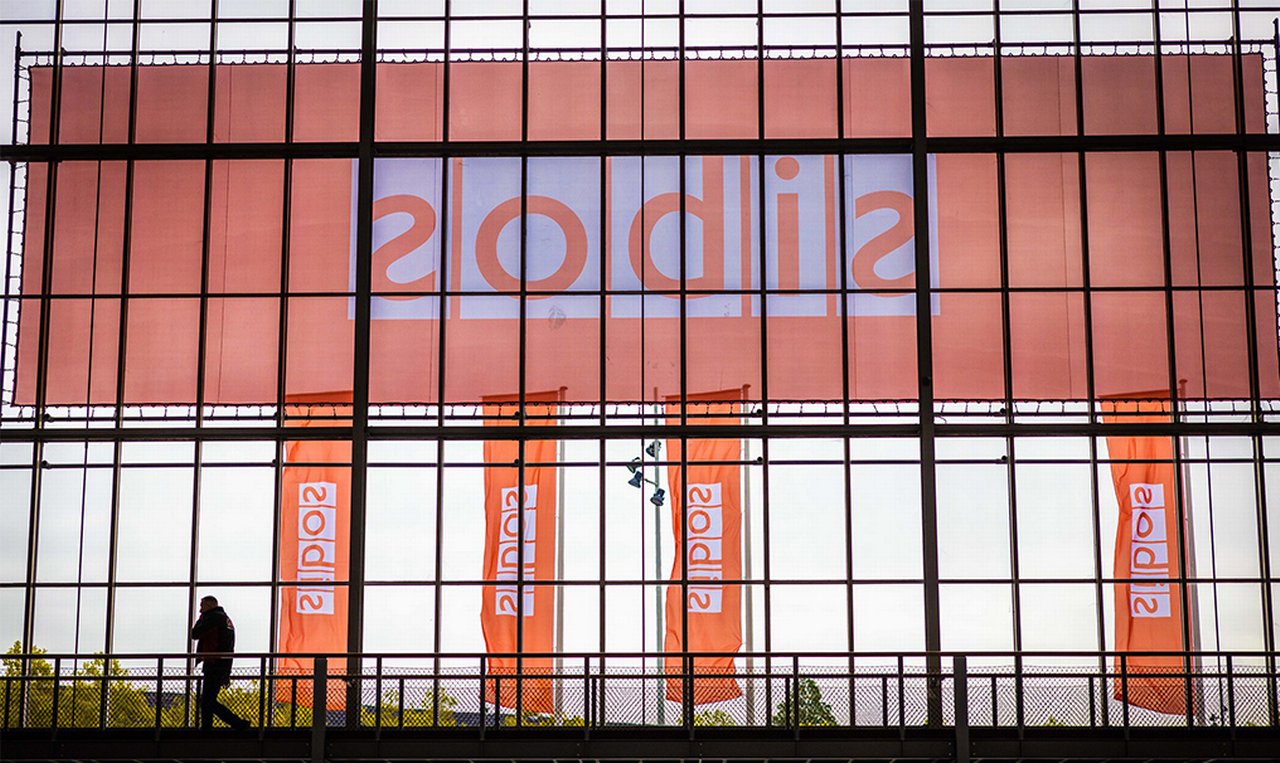10 November 2022
In the final instalment of Deutsche Bank’s post-Sibos reports, flow’s Editor Clarissa Dann turns to trade finance – a resurgent theme in 2022. Digitalising trade finance has moved from “wait and see” to “let’s get this done”. But the balance of regulatory impulsion and industry steering remains unclear
MINUTES min read
Having had a few Sibos events where trade and trade finance content was a tad thin on the ground – feedback to that effect had clearly been taken on board. Sibos Amsterdam 2022 had no less than seven core trade finance sessions.
Inflation, together with a sustained move away from multilateralism as the world has de-globalised, has put a lot of pressure on the global trade ecosystem – and its financiers. It was therefore no surprise that sessions centred around not only the economic climate, but where trade has got to in its ongoing quest for digital transformation and interoperability –revisiting the hot topics from Sibos in Singapore back in 2015.
Economic backdrop

Left to right: Dr Rebecca Harding (Coriolis Technologies); Clarissa Dann and Atul Jain (Deutsche Bank)
In her article, Trade and inflation: the five basic issues, trade economist Dr Rebecca Harding highlights growth in import and export values of 50% and 49% respectively between February and March 2022. She expanded on this in the #viewfromsibos video interview with Deutsche Bank’s Global Co-Head of Trade Finance & Lending, Atul Jain, warning that once this “builds into trade, it feeds into inflation over a period of time”.
Jain expressed his concerns about the effect this would have on energy transition provision. “What we’ve seen of late is an increase in the value rather than the volume of trade, due to an inflation-driven increase in underlying prices. And with US$250trn of investment needed by 2050 for energy transition alone – which will have to be financed though both government and corporate balance sheets – we can expect inflation to remain sticky and commodity and energy prices to remain persistently high.”
Two grey rhinos

Left to right: Todd Burwell (BAFT); James Binns (Barclays); Vijay D’Silva (McKinsey); Pamela Mar (ICC); and Stuart Roberts (J.P. Morgan)
Inflation and energy security are just two examples of how global trade is shaped by the external environment. Currently, trade navigates a second (unforeseen) ‘black swan’ event in the form of the Russia/Ukraine crisis that presented itself hot on the heels of the Covid-19 pandemic.
Day 3 of Sibos reprised the virtual Sibos 2021 popular session but now entitled: ‘Black Swans. Gray Rhinos. Dragon Kings #Version 2022’. The panel grappled with not only the black swans but other allegorical creatures, such as grey rhinos (known but unaddressed threats) and dragon kings (unprecedently huge, impactful and unique events) that also lie in wait.
As Stuart Roberts, Global Head of Trade at J.P. Morgan put it, “Grey rhinos give birth to black swans.” Readers won’t be surprised to see climate change among the chief discussion points here, with James Binns, Global Head of Trade & Working Capital at Barclays reflecting how the impacts are already being felt. “Just look at this year, where the drought on the Yangtze River has impacted hydroelectric production and, in turn, manufacturing capacity. In India, high temperatures have impacted wheat production, which has resulted in wheat export bans. And we’ve all seen pictures of boats stranded on the Rhine.”
All of this spells a bleak picture for supply chains, many of which have infrastructure and logistics at sea level. A central priority, then, is making supply chains more resilient to this looming risk.
Equally pressing, meanwhile, is the grey rhino of global income disparity, stoked by a long period of unprecedentedly accommodative monetary policy. “From 1999 to 2018, central banks pursued a unique policy of easing, pumping US$23trn of new money into markets that never came back out,” said Roberts. “That’s the entire GDP of the US, creating nothing, just searching for yield.”
The effect of this, has been to create a massive inflationary effect in the business world that has not been factored into the consumer price index (CPI) – hurting salaried workers, favouring those paid in dividends and assets and thereby driving income inequality. This has been hidden for some time by various deflationary factors, including globalisation driven by China’s entry into the World Trade Organisation in 2001, the US energy revolution in the early 2000s, which lowered energy prices, and the introduction of the euro, which pushed down the costs of German products and services.
With these events having run their course, the grey rhino in the form of two decades of loose central bank policy is now, reflected panellists, “turning into a black swan”.
Priorities for the industry include rolling out deep-tier financing – finding ways to offer lending products to smaller businesses – and continued collaboration to solve major challenges such as digitalisation of trade (essential for deep tier financing), and as J.P. Morgan’s Roberts puts it, “functional for the long term”.
“Digitalising trade documents could generate £25bn in new economic growth by 2024 and free up £224bn in efficiency savings”
Digital frameworks and platforms
Democratising finance and solving the problem of the trade finance gap (currently estimated at around US$1.7trn), is about facilitating self-service rather than aid in the form of foundations and philanthropy, reflected Pamela Mar, who had just joined the International Chamber of Commerce as Managing Director of its Digital Standards Initiative. She sees trade as a proven means to “create jobs, empower people, and generate the resources for sustainable inclusive growth” and, importantly, believes that “digitalisation could amplify this many times over”.1
Indeed, the ICC estimate that digitalising trade documents “could generate £25bn in new economic growth by 2024 and free up £224bn in efficiency savings” was quoted by the UK’s Law Commission in its raison d’être for the proposed Electronic Trade Documents Act -the Bill – introduced into Parliament during Sibos on 12 October.2 The bill “proposes changes to the law that would allow for the legal recognition of electronic versions of trade documents, such as bills of lading and bills of exchange”.
The entire Sibos zone of fintech stands next to the Innotribe area was a reminder of how many different digital islands and “solutions” have sprung up. Although not all trade fintechs were exhibiting at Sibos, the trade fintech community – such as electronic bills of lading and digital promissory notes – was very much in evidence at the sessions covering digitalisation. Lloyds Bank had just announced the UK’s first digital promissory note purchase on 18 August implementing Swedish provider Enigio’s technology that complies with the International Trade & Forfaiting Association’s dDOC specifications.3 Trade Information Network – the purchase order financing platform that did have a stand and gave a presentation session that reported 12 banks and 10 corporates are now live on the platform. The presenters of ‘Trade Information Network – Customer Perspective’ were very aware that adoption and scaling up were key next steps.
Despite developments in legislation and calls for standards, a single dominant digital solution for connecting players in global trade, for many was simply not realistic. Instead, the focus is on facilitating interoperability between the various platforms already active in the space. At the centre of this effort is a quest to encourage global use of common standards and open APIs.

Sharyn Trainor, Managing Director, Product Management, Deutsche Bank on why collaboration will get digital trade finance done
On Day 1 of Sibos, panellists gathered on Conference Stage 3 to discuss "Bridging Digital Platforms: is interoperability a pipedream or a possibility?". Interoperability is already technically feasible, of course, but a host of thorny challenges – including the proliferation of manual and often paper-intensive operations, as well as varying international standards, norms, rules, and legal frameworks – have provided resistance for broader industry initiatives to digitise and share information.
To push through these challenges, open APIs and standardisation emerged as key pillars, enabling quicker and easier transfer of data. As anyone who has followed the payments landscape’s standardisation journey with the implementation of ISO 20022 can attest, however, harmonisation and the adoption of new infrastructure, does not happen overnight.
Yet this is no reason for pessimism. As Sharyn Trainor, Managing Director, Product Management, Deutsche Bank, noted in her opening remarks (quoting America’s Eleanor Roosevelt), nothing has ever been achieved by the person who says it can't be done. “Once we understand that,” continued Trainor, “we can then discuss what it will take to get there, and one piece of that has to be collaboration” This was a point she re-emphasised afterwards in flow’s #viewfromsibos video interview published on LinkedIn on the Deutsche Bank Corporate Bank channel, with a reminder that the industry had to work together to get it done – to avert prescription by regulators. The Payment Services Directive (PSD2), was, after all, mandated.
Lynn Ng, Global Head of Commodities, Food & Agri, ING Bank, observed, “Everyone is operating their own little island. Everybody’s got to start talking the same language.” She developed the point in an earlier Sibos article.4 “systems should be able to communicate with each other regardless of the platforms or technology they’re based on” and citing the ICC’s Data Standards toolkit5 as “an important development”.
The first step, then, is agreement on what that language should be. The ICC toolkit is an attempt to address this question, promoting policy coherence and the harmonisation of digital trading standards for businesses and governments worldwide. The initiative aims to drive greater adoption of existing standards, as well as to create new frameworks to unify digital trade processes. Yet, like learning a language, collaborating to adopt mutually beneficial digital standards will take time, hard work and patience.
In the meantime, the emergence of open APIs offers the industry a “digital bridge” – enabling trade finance providers to share safe, secure, and pre-authorised data across multiple geographies quickly and cheaply. However, as with the push for adoption of industry standards, education and collaboration will be needed before open APIs can realise their full potential.
With a number of digital trade projects showcased at past Sibos events not having moved the digital journey forward (it would be unhelpful to list them given the amount of time and investment that went into them), there needs to be united push forward. You get uptake, said Trainor, when you “reduce complexity and increase the value to the customer”, which kind of sums up the graveyard of Great Trade Projects That Are No More…
Decentralising trade finance

Left to right: Kimberley Long (The Banker – moderator); Kai Fehr (Standard Chartered); Willayna Banner (Microsoft); Marion Laboure (Deutsche Bank); and Vina Mendonca (HSBC). Note that Citi’s Ope Olomo joined by video link
If promoting common standards and connecting existing infrastructure is the conservative approach to driving connectivity and efficiency in the fragmented trade finance space, the counterpoint is the push for decentralised trade finance. Drawing on distributed ledger technology (DLT), decentralised trade finance sets out to prune some of trade finance’s inherent complexities with a more efficient approach.
“if you reduce the number of intermediaries, you remove a lot of the complexity.”
“We use many intermediaries in trade finance, and because of that, trade finance throws up complex problems,” noted Marion Laboure, Macro Strategist at Deutsche Bank, speaking on Conference Stage 1 for Day 4’s session, ‘Should global trade finance go decentralised?’. “Decentralised finance eliminates intermediaries, however, and if you reduce the number of intermediaries, you remove a lot of the complexity.”
By virtue of this, a decentralised approach stands to bring not only greater simplicity to the industry, but also greater security, transparency, and efficiency. Proponents point to concrete examples such as smart contracts, which can be executed via decentralised trade finance – enabling transactions to be settled automatically based on trigger events.
“An easy example might be a letter of credit,” said Willayna Banner, Head of Web3/Blockchain, Microsoft Cloud for Industry & Global Expansion Team at Microsoft. “This can be executed via a smart contract on the blockchain without intermediaries. Clearly, that's going to be much more efficient.”
Yet concerns remain about the decentralised approach. As Banner continued, “At the same time, one can imagine that these institutions may not want to have everything so visible on the blockchain and would require some level of privacy. This is a key consideration when it comes to use cases because privacy is definitely a big obstacle to overcome.”
Similarly, with trade relationships and trade finance anchored in trust – and with much of that trust derived from existing processes and regulation (going back to Lynn Ng’s point earlier) – is it possible for a decentralised model that does away with these components to succeed? Some degree of regulatory intervention and central control will be needed here to tackle issues such as verification of identity and providing insight into credit profiles, which not all participants will be able to carry out themselves.
As Laboure put it, “There is always a trade-off between innovation and regulation.” In her #viewfromsibos LinkedIn interview afterwards she added:
“Trade finance might be an area for disruption due to its complexity and the high number of intermediaries. One of the key risks remains fraud and blockchain can help to overcome this issue. But challenges remain regarding:
- The ability of blockchain technology to trace all the transactions;
- Smart contracts (we still need human interaction e.g. for disputes/resolution); and
- The absence of regulation.”
Looking forward, the industry needs space to innovate without restraints, but as new solutions take hold and are implemented, regulation should come alongside it to provide the checks and balances. But should it (and will it) provide the catalyst to turn a seven-year conversation into a unified system that works for all? Time will tell.
Sibos 2022 Amsterdam took place at the RAI Convention Centre from 10 to 13 October 2022 and is available virtually to Sibos registrants on demand
Sibos 2023 Toronto will be held 18–21 September 2023

Photo: © SWIFT
Trade finance solutions Explore more
Find out more about our Trade finance solutions
solutions
Stay up-to-date with
Sign-up flow newsbites
Choose your preferred banking topics and we will send you updated emails based on your selection
Sign-up Sign-upSubscribe Subscribe to our magazine
flow magazine is published annually and can be read online and delivered to your door in print
You might be interested in
SECURITIES SERVICES
Sibos – unwrapped Part 2 Sibos – unwrapped (Part 2)
In the second of three Sibos 2022 reports, flow’s Clarissa Dann takes a closer look at the evolving post-trade landscape and key themes such as settlement compression and efficiency that impact global custodians, sub-custodians and network managers
CASH MANAGEMENT
Sibos – unwrapped (Part 1) Sibos – unwrapped (Part 1)
Sibos Amsterdam 2022 returned to an in-person event at the RAI Convention Centre against the backdrop of rising inflation, energy security worries and increased levels of financial crime. In the first of three post-Sibos reports, flow’s Clarissa Dann takes a deep dive into post-pandemic payments
TRADE FINANCE, MACRO AND MARKETS
Trade and inflation: the five basic issues Trade and inflation: the five basic issues
As the world grapples with cost of living and energy security crises, inflation continues its relentless rise. Dr Rebecca Harding considers five questions around the links between inflation and trade, finding the answers in trade flow data



